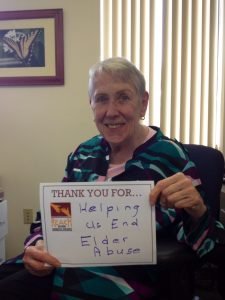Last fall, REACH was awarded a federal grant under the Violence Against Women Act to lead a group of community partners in enhancing the safety of elders in the City of Waltham. Together with Springwell Adult Protective Services, the Waltham Police Department, the Middlesex District Attorney’s Office, and the Dual Domestic Violence/Sexual Assault Program at Newton-Wellesley Hospital, we have formed the group called Waltham Against Abuse in Later Life (WAALL).
While the term ‘elder abuse’ may bring to mind images of exploitive institutional caretakers, surveys of elders find that they are more likely to be abused by a family member. Elder abuse by a relative is less likely to be prosecuted than abuse involving a stranger or an institution. In many cases, elders abused by a relative do not wish to have their abuser prosecuted. This may be because they do not want him or her to face criminal charges, or they fear criminal consequences will trigger retribution by someone they continue to depend on for financial support, physical caretaking, or companionship. Sometimes, it is the abuser who depends on the victim for financial support. Many cases of elder abuse by a relative involve elements of financial exploitation. Even if the elder recognizes this, he/she may still feel responsible for providing ongoing financial assistance and housing for the relative.
Compounding this problem are generational biases that may influence potential interveners to treat elder abuse by a relative less seriously than cases involving a stranger or caretaking institution. These include misperceptions that elder victims are simply too settled in their situations to seek changes, or that the abuser’s behavior is primarily a result of dementia or caretaker stress.
Depending on their current health conditions, elders may be isolated in their home, relying on caretakers who are often family members. Reaching them requires a network of individuals who understand the complexities while knowing how to help the victim understand their options. It may also require identifying new resources and options. For example, while someone younger and more mobile can potentially seek to relocate to get away from their abuser, someone who requires assisted living arrangements faces additional barriers. With health care models changing and efforts being made to ensure that individuals can remain at home, the number of elders at risk for abuse will likely increase. Thirty percent of Waltham’s population is aged 50 and older, a number that will continue to increase as the Baby Boomer generation ages.
This spring, we began the project by distributing surveys to elders and to service providers in the community. This process, called a “community needs assessment,” was intended to take stock of existing resources in the city and to hear from those most directly affected where they saw gaps in services and what concerns they had. We have also, along with partner agencies, attended two trainings by the Office of Violence Against Women (OVW) and the National Clearinghouse Against Abuse in Later Life (NCALL). These were “Train the Trainer” seminars, designed to equip us to deliver trainings in our own community, specifically for law enforcement and for service providers. We will deliver these trainings to law enforcement this fall and to service providers after that. The goal of the trainings is that law enforcement officers, service providers, and other community partners will be better able to identify and support elder victims of abuse and understand the unique challenges faced by this population and the ambivalence they may feel about involving law enforcement in their situation.
Last but not least, one of the major goals of this grant is to develop a Coordinated Community Response (CCR) Team to handle cases of elder abuse in Waltham. Similar to the High Risk Team model, this would be a group of law enforcement, service providers, the courts and other community members who may come in contact with elderly residents. This team would meet regularly to discuss cases that come across their desks, and to make sure that victims do not slip through the cracks. Members of the CCR will also engage in a review of their own policies and protocols to make sure they are helping to identify, investigate, and prosecute cases of elder abuse.
We will be holding a kick-off event in the fall to officially launch the WAALL campaign and the Coordinated Community Response team. Be sure to follow us on social media for information about the event as it gets closer. And if you are someone who works with elders in the City of Waltham, we want to hear from you! Contact Pat Cooper, our Elder Services Project Coordinator and Advocate, at (781) 891-0724 ext. 118 to let her know how you’d like to be involved.






